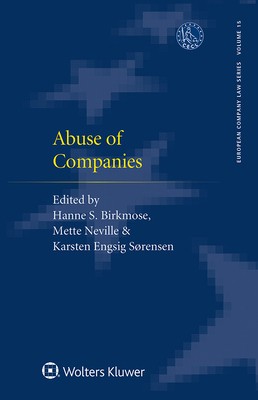
- Išsiųsime per 10–14 d.d.
- Leidėjas: Kluwer Law International
- ISBN-10: 9403508922
- ISBN-13: 9789403508924
- Formatas: 15.6 x 23.4 x 2.4 cm, kieti viršeliai
- Kalba: Anglų
- Extra -15 % nuolaida šiai knygai su kodu: ENG15
Abuse of Companies + nemokamas atvežimas! | knygos.lt
Atsiliepimai
Aprašymas
Whether the corporate form is used to avoid liabilities or cover illegal acts, or whether abuse is practised to obtain certain advantages, the subject of this first-ever in-depth survey and analysis garners more attention every day - both in legal literature and in popular media. Taken together, the authoritative contributions in this book clearly and comprehensively reveal typical situations where abuse may take place and how company law and other areas of law have tackled these incidents and practices in a variety of key jurisdictions.
Focusing on Europe but with global implications, the topics raised include the following:
- how group structures may be used by multinational enterprises to escape regulation and avoid taxation;
- whether the decision to incorporate a company in a particular jurisdiction may be abusive;
- companies set up for the purpose of money laundering;
- letterbox companies formed as a front to allow a company to benefit from one legal regime and avoid others;
- ex post transfers of seats such as cross-border mergers and conversions;
- when the use of phoenix companies may constitute an abuse of the corporate form;
- how corporate mobility is used to circumvent worker participation; and
- how online company formation and technological innovation may foster abuse.
This book helps to explain how the line is drawn between abuse and (creative) use of the corporate form. Remedies covered include restricting the use of bearer shares, setting minimum capital requirements, piercing the corporate veil, ensuring transparency of beneficial ownership, using insolvency law to lodge claims against directors and shareholders and recover assets, and applying the general principle prohibiting abuse.
There is no other book on the market focusing on abuse of companies and giving such a comprehensive analysis of the topic. Practitioners will get guidelines on how to avoid becoming involved in activities that may constitute abuse and how to address instances where abuse has occurred, and interested academics, legislators, and enforcement authorities in Europe and beyond will find this book's perspectives invaluable.
EXTRA 15 % nuolaida su kodu: ENG15
Akcija baigiasi už 15:19:06
Nuolaidos kodas galioja perkant nuo 10 €. Nuolaidos nesumuojamos.

- Leidėjas: Kluwer Law International
- ISBN-10: 9403508922
- ISBN-13: 9789403508924
- Formatas: 15.6 x 23.4 x 2.4 cm, kieti viršeliai
- Kalba: Anglų
Whether the corporate form is used to avoid liabilities or cover illegal acts, or whether abuse is practised to obtain certain advantages, the subject of this first-ever in-depth survey and analysis garners more attention every day - both in legal literature and in popular media. Taken together, the authoritative contributions in this book clearly and comprehensively reveal typical situations where abuse may take place and how company law and other areas of law have tackled these incidents and practices in a variety of key jurisdictions.
Focusing on Europe but with global implications, the topics raised include the following:
- how group structures may be used by multinational enterprises to escape regulation and avoid taxation;
- whether the decision to incorporate a company in a particular jurisdiction may be abusive;
- companies set up for the purpose of money laundering;
- letterbox companies formed as a front to allow a company to benefit from one legal regime and avoid others;
- ex post transfers of seats such as cross-border mergers and conversions;
- when the use of phoenix companies may constitute an abuse of the corporate form;
- how corporate mobility is used to circumvent worker participation; and
- how online company formation and technological innovation may foster abuse.
This book helps to explain how the line is drawn between abuse and (creative) use of the corporate form. Remedies covered include restricting the use of bearer shares, setting minimum capital requirements, piercing the corporate veil, ensuring transparency of beneficial ownership, using insolvency law to lodge claims against directors and shareholders and recover assets, and applying the general principle prohibiting abuse.
There is no other book on the market focusing on abuse of companies and giving such a comprehensive analysis of the topic. Practitioners will get guidelines on how to avoid becoming involved in activities that may constitute abuse and how to address instances where abuse has occurred, and interested academics, legislators, and enforcement authorities in Europe and beyond will find this book's perspectives invaluable.




Atsiliepimai